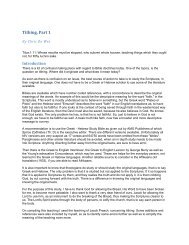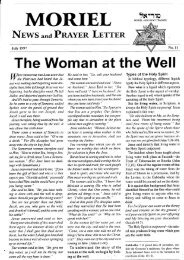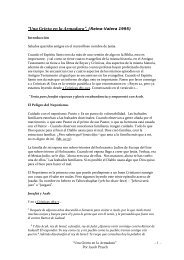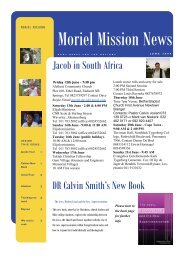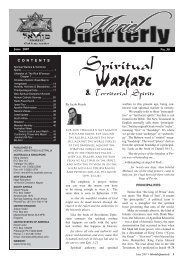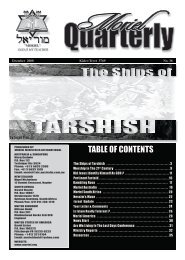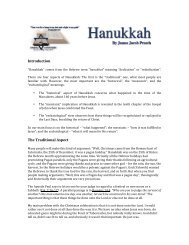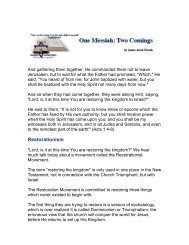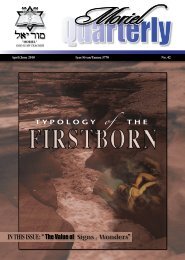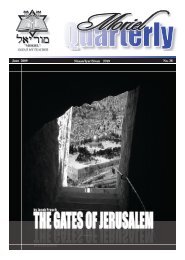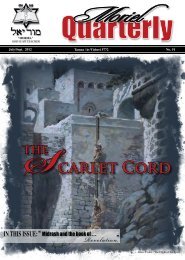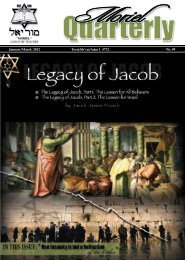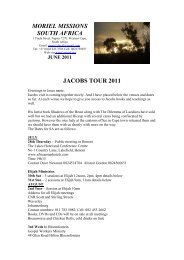Types of Rapture (~9.1 MB) - Moriel Ministries
Types of Rapture (~9.1 MB) - Moriel Ministries
Types of Rapture (~9.1 MB) - Moriel Ministries
Create successful ePaper yourself
Turn your PDF publications into a flip-book with our unique Google optimized e-Paper software.
Danny Isom<br />
Guest Author<br />
Leaving the Elementary<br />
T E A C H I N G S<br />
“For though by this time you<br />
ought to be teachers, you<br />
have need again for someone<br />
to teach you the elementary<br />
principles <strong>of</strong> the oracles <strong>of</strong> God,<br />
and you have come to need milk<br />
and not solid food. For everyone<br />
who partakes only <strong>of</strong> milk<br />
is not accustomed to the word<br />
<strong>of</strong> righteousness, for he is an<br />
infant. But solid food is for the<br />
mature, who because <strong>of</strong> practice<br />
have their senses trained<br />
to discern good and evil. Therefore<br />
leaving the elementary<br />
teaching about the Christ, let us<br />
press on to maturity, not laying<br />
again a foundation <strong>of</strong> repentance<br />
from dead works and <strong>of</strong><br />
faith toward God, <strong>of</strong> instruction<br />
about washings and laying<br />
on <strong>of</strong> hands, and the resurrection<br />
<strong>of</strong> the dead and eternal<br />
judgment.”<br />
Hebrews 5:12-6:2<br />
While recently studying through Hebrews<br />
in concert with “The 2008 Walk<br />
with the Word Reading Plan” (http://www.<br />
walkwiththeword.org/index.html) this particular<br />
passage was in no small way deeply<br />
disturbing. The writer <strong>of</strong> Hebrews provides<br />
a specific list described as “elementary<br />
principles” and “elementary teaching,” for<br />
which he admonishes Christians as falling<br />
far short <strong>of</strong> the “solid food” needed to attain<br />
spiritual maturity in Christ. This list<br />
alarmed me because so many Christians’<br />
exposure to God’s Word has been so greatly<br />
minimized today that I would be absolutely<br />
elated if they actually knew these basics.<br />
There are six things specifically identified<br />
as “elementary teaching,” the things<br />
which every believer should know without<br />
question:<br />
“…repentance from dead works…”<br />
This refers to the old way <strong>of</strong> adhering<br />
only to the Old Testament Law. This<br />
was the message <strong>of</strong> John the Baptist,<br />
to repent <strong>of</strong> going through the motions<br />
<strong>of</strong> being religious and to become truly<br />
changed from the heart; to repent in<br />
order to accept the “live” works, so to<br />
speak, to come through the Messiah.<br />
“…faith towards God…” This is<br />
the distinction <strong>of</strong> having a relationship<br />
with God based not on keeping<br />
the Old Testament Law, but upon a<br />
faithful relationship with Him through<br />
Christ. [Note: “Faith” and “faithfulness”<br />
are always interchangeable<br />
words in both the Greek and Hebrew.]<br />
“…instruction about washings…”<br />
Although some translations use “baptism,”<br />
“washings” is the better term<br />
as the Greek word for baptism isn’t<br />
actually used here. The plural form<br />
<strong>of</strong> the word is also inconsistent with<br />
the concept <strong>of</strong> singular baptism, as<br />
we are baptized but once. Therefore it<br />
refers to the act <strong>of</strong> regeneration which<br />
is performed by the Holy Spirit when<br />
one receives Christ, and it stands<br />
in contrast to the Old Testament’s<br />
myriad cleansing requirements and<br />
rituals which were a shadow teaching<br />
<strong>of</strong> the work <strong>of</strong> the Holy Spirit. “He<br />
saved us, not on the basis <strong>of</strong> deeds<br />
which we have done in righteousness,<br />
but according to His mercy, by the<br />
washing <strong>of</strong> regeneration and renewing<br />
by the Holy Spirit.” (Titus 3:5)<br />
“…laying on <strong>of</strong> hands…” Most<br />
likely this refers to the laying on <strong>of</strong><br />
hands to receive the gifts <strong>of</strong> the Holy<br />
Spirit, probably an “elementary”<br />
teaching following the point <strong>of</strong> salvation<br />
as evidenced in the early Church<br />
(e.g., Acts 8:17-18; 9:17). The gift<br />
provided generally identifies a calling<br />
to perform greater works/deeds<br />
on behalf <strong>of</strong> the Kingdom <strong>of</strong> God.<br />
“…the resurrection <strong>of</strong> the dead…”<br />
Another teaching that would logically<br />
follow closely to the early stages <strong>of</strong> a believer’s<br />
salvation experience referring<br />
to the hope <strong>of</strong> the resurrection <strong>of</strong> believers<br />
as a result <strong>of</strong> Christ’s resurrection.<br />
“…eternal judgment…” You know…<br />
that final “big” one.<br />
Just honestly take the time to score yourself,<br />
your local church, and the Christians<br />
you know best as to the quality and depth <strong>of</strong><br />
knowledge each one has when it comes to<br />
this laundry list <strong>of</strong> “elementary” teachings:<br />
• Repentance <strong>of</strong> sin/the old life.<br />
• Walking in faith/faithfulness towards<br />
God.<br />
• Walking according to the Spirit.<br />
• Receiving/employing the gifts <strong>of</strong> the<br />
Holy Spirit.<br />
• The hope (future fact) <strong>of</strong> our reurretion<br />
in Christ.<br />
• Final judgment.<br />
Isn’t it shocking that there might be<br />
Christians who don’t know these, the basic<br />
components <strong>of</strong> Christianity I’m not trying<br />
to be elitist or overstate my own understanding<br />
<strong>of</strong> God’s Word and ways, but instead<br />
I’m struggling to come to terms with<br />
the fact that so many are being improperly<br />
fed in western churches. If you or your local<br />
church aren’t thoroughly versed in these<br />
basics <strong>of</strong> Christianity, what exactly has<br />
been your focus instead When the basics<br />
are missing, what has been substituted in<br />
the name <strong>of</strong> God’s Word If we don’t know<br />
the basics, why would we even suppose to<br />
have a grasp on the deeper things <strong>of</strong> Christ<br />
And then, as the Walk with the Word<br />
reading plan moved me through the book<br />
<strong>of</strong> Romans, I was struck with the number<br />
<strong>of</strong> times Paul asks rhetorical questions,<br />
using some form <strong>of</strong> “Don’t you know”<br />
Whereas many a seminary treats Romans<br />
as the centerpiece to developing and teaching<br />
what they term “Pauline theology,” the<br />
June 2008 • <strong>Moriel</strong> Quarterly 15




